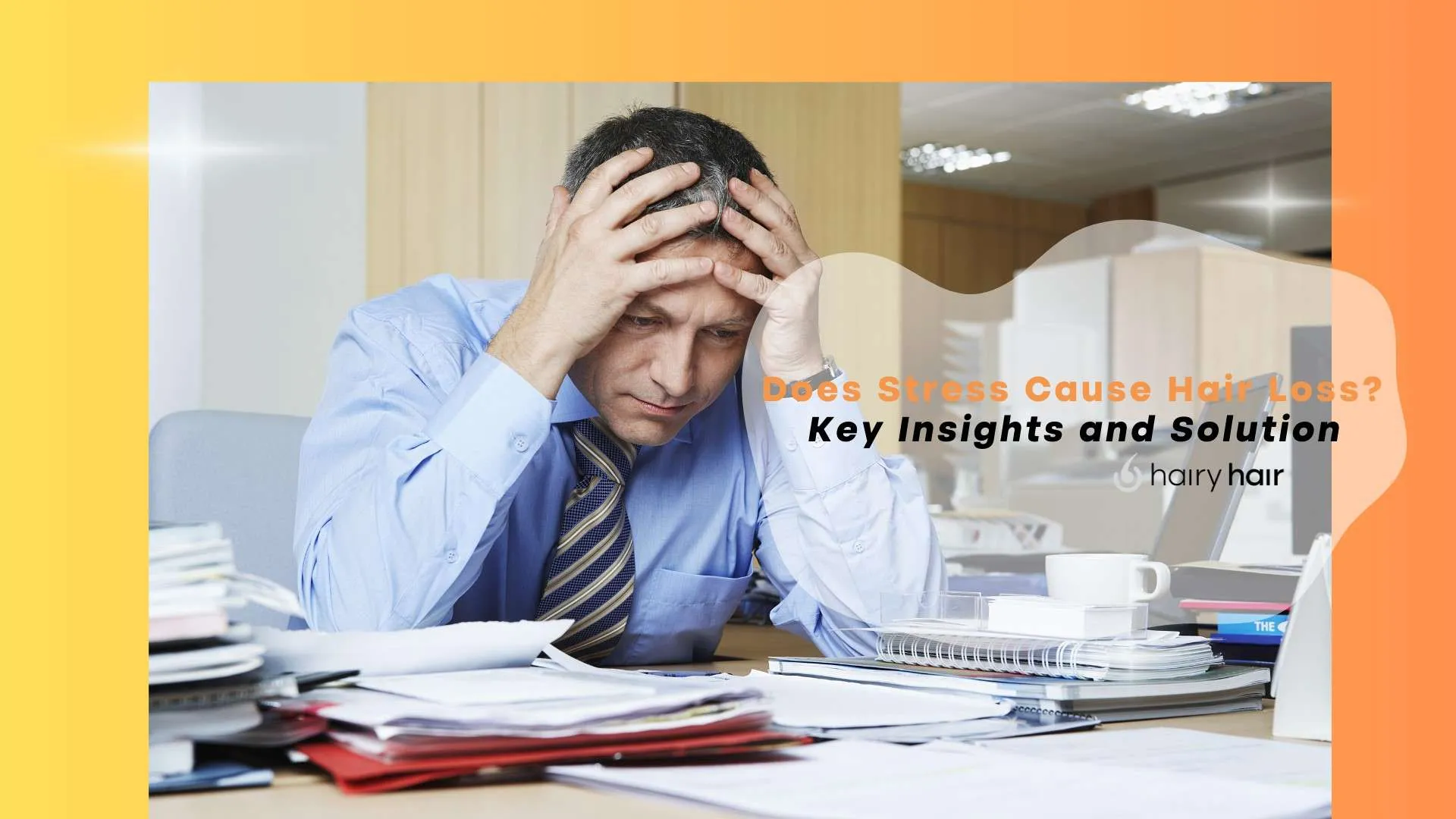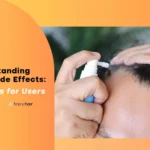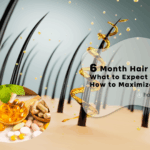Does Stress Cause Hair Loss? Key Insights and Solutions

Stress can have negative impacts on many aspects of your life but one that may cause visible concern is hair loss. Your body reacts to stress that comes from a range of sources, from physical or emotional stressful life events to the introduction of new medications or a surgical procedure.
We’ll take a look at the different causes of stress-related hair loss and what signs you should be looking out for. We’ll also explore the treatments and strategies to achieve hair regrowth. Finally, we’ll see how Hairy Hair may help you stimulate hair growth if you’re suffering from other types of hair loss.
Acute telogen effluvium usually lasts fewer than six months. Hair shedding typically takes place two to three months after a stressful event. Chronic telogen effluvium will typically last longer than six months and the cause of the issue may not be clear.
Up to 70% of your hair in the anagen stage can prematurely enter the telogen phase, causing hair loss.
How stress affects the hair growth cycle
Hair growth involves three stages: anagen, catagen, and telogen. The anagen phase is the active phase of hair growth that allows hair follicles to produce new hair strands. The catagen phase is a short transitional phase between the anagen and telogen phases where hair growth slows down as it prepares to fall out.
Stress can cause an extended resting phase (telogen) and reduced hair growth. 80-90% of scalp hair is in the growth stage and when that balance shifts hair loss becomes noticeable.
Chronic stress can impair hair follicle stem cells, leading to reduced hair growth and extended resting phases.
The stress hormone corticosterone inhibits hair follicle regeneration and regrowth by preventing the dermal papilla from secreting GAS6, a molecule that activates hair follicle stem cells.
What are other types of stress-related hair loss?
Trichotillomania (hair pulling)
Trichotillomania is a less common but more serious condition. This type of hair loss manifests through an irresistible urge to pull one’s hair out.
It is often triggered by stress, anxiety, or boredom.
This hair-pulling disorder requires professional help. This will often involve therapy and medication which is done to manage the underlying emotional issues causing the hair pulling and prevent long-lasting hair loss.
Trichotillomania can lead to significant hair loss, scarring, skin diseases, and emotional distress if left untreated.
[elementor-template id=”9678″]
How can I identify stress-related hair loss?
Sudden onset
Hair loss typically begins a few months after a stressful event.
Stress-related hair thinning often has distinct characteristics that can help differentiate it from other causes. Telogen effluvium is unlikely to have an impact on the hairline or lead to total baldness.
Hair falls from all over the scalp, rather than in a specific pattern like male pattern hair loss or female pattern baldness.
Instead of the usual 100 strands of hair lost per day, people with telogen effluvium can lose up to 300 strands of hair daily.
How can I treat stress-related hair loss?
Address the stressor
If possible, try to eliminate or minimise the source of stress in your life.
Identify and address the underlying emotional issues that may be contributing to stress-related hair loss.
Consider seeking professional help from a therapist or counsellor to manage stress and anxiety.
Relaxation and stress management techniques
Extreme stress or chronic stress levels can be reduced through practices like meditation, deep breathing exercises, and yoga.
Relaxation techniques can help promote hair growth and reduce hair shedding.
Regular exercise and a healthy diet can also help reduce stress and promote overall well-being.
Healthy lifestyle choices
Getting enough sleep, eating a balanced diet, and exercising regularly all contribute to a healthy body and mind.
Healthy lifestyle choices can help stimulate hair growth and decrease hair loss.
Avoiding excessive heat styling and using gentle hair care products can also help promote hair health.
Hair growth and recovery
Will my hair grow back after stress-related hair loss?
Hair will regrow naturally after the stressor resolves and your hormones have a chance to readjust to normal levels in most cases of telogen effluvium.
Hair growth can take time, and it’s essential to be patient and focus on promoting overall hair health.
With proper care and attention, hair can regrow and recover from stress-related hair loss.
Can I treat stress-related hair loss with medications?
Hair loss can be a symptom of stress, so it is best to deal with the stressor directly.
Hair loss treatments can help stimulate hair growth and encourage a faster, healthier recovery for your hair if the condition concerns you.
Consult a doctor to determine the best course of medical treatment for stress-related hair loss.
Seeking professional help
When to see a doctor about hair loss
It’s advisable to consult a doctor if you experience any of the following:
- Sudden or excessive hair loss
- Hair loss that persists or worsens over time
- Hair loss accompanied by other symptoms such as itching, scaling, or redness
- Hair loss that is causing emotional distress or affecting daily life
[elementor-template id=”9673″]
How can Hairy Hair help with your hair loss?
Whether you’re looking to support your hair growth after a stressful event or are seeking treatment for pattern hair loss Hairy Hair can potentially help to regrow hair. Our medication works to help dilate blood vessels, providing more oxygen and nutrients to the hair follicles.
Alongside working as a dihydrotestosterone (DHT) blocker, possibly preventing hair follicles from shrinking, our formula also includes natural growth promoters.
To start your potential hair regrowth journey, all you need to do is fill in a quick online form so we can get to know you and your hair loss. From there a qualified Australian GP will review your details and call you to discuss your treatment plan as well as address any questions you may have. Finally, your prescription will be delivered straight to your door. Manage your hair treatment all from the comfort of your home.
Final thoughts
A stressful event can cause a range of issues in your life including hair loss. While it may go away on its own, it can be concerning if hair loss persists for long periods. Being proactive about your hair loss is the best way to prevent future hair loss and provide your scalp with the potential for healthy hair growth.
Contact Hairy Hair today to begin your potential hair growth treatment. Our dedicated support team is on hand to help you monitor your progress and guide you every step of the way. Your hair loss is unique and your treatment should be too.
In This Article
Overview
Most Trending Articles


